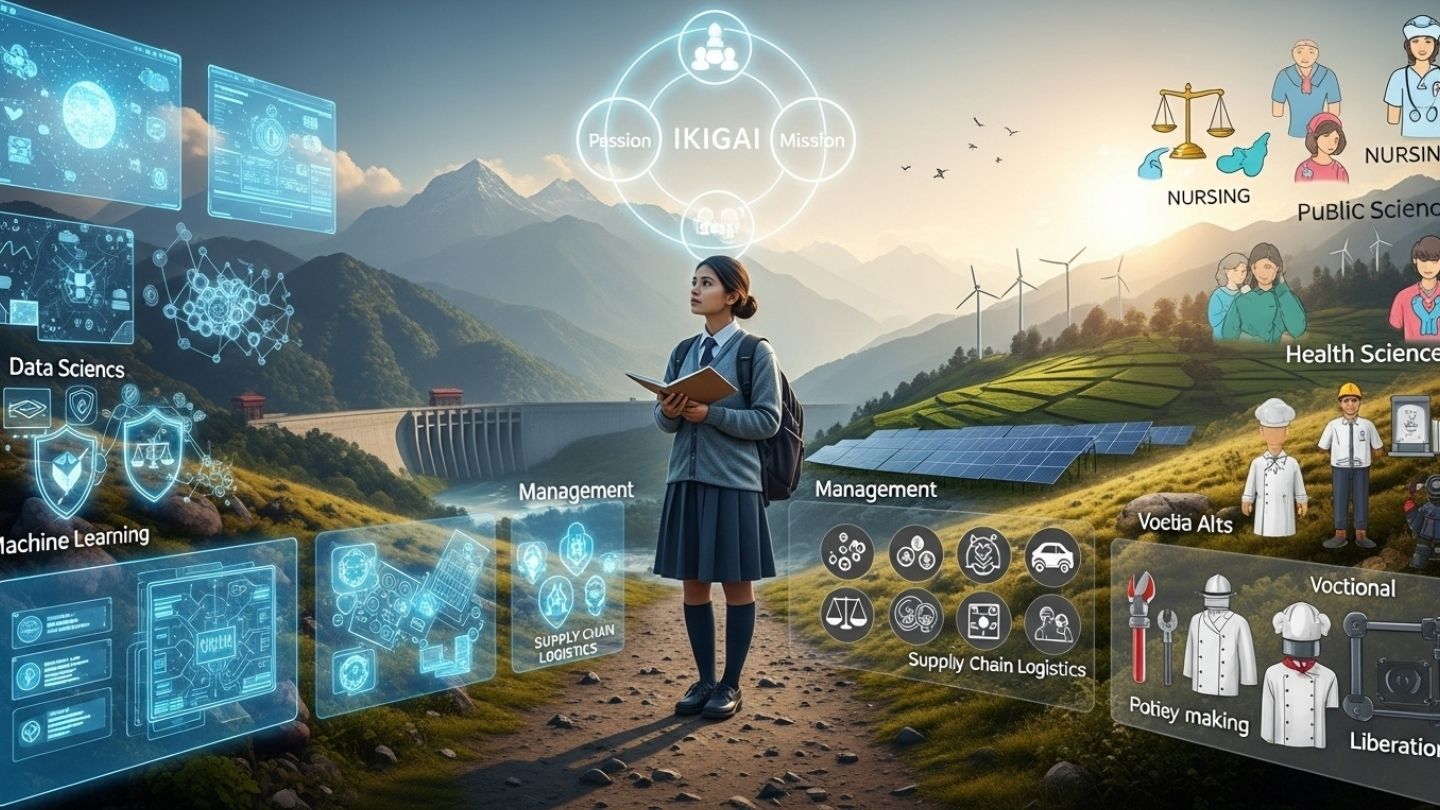
What to Study in the AI Era: A Detailed Guide for Students and Parents
For students standing at the crossroads of education and career, and for their parents, this has become the most complex and important question: “What should we study in this era?”
In the past, a strong social norm existed in Nepal: “Good students must study science and become doctors or engineers.” Slightly weaker students would study management, and the remaining ones would go to humanities.
However, in the age of AI, this traditional equation has completely broken down. Artificial Intelligence (AI), climate change, geopolitical unrest, and a changing world economy have transformed the job market.
Based on recent reports from the World Economic Forum (WEF) and the International Labour Organization (ILO), this article presents a detailed and evidence-based analysis of what kinds of subjects students should choose now.
1. Technology and Data Science – In a New Format
Studying IT is no longer a “fashion”; it has become almost a “necessity.”
However, learning only traditional coding is no longer enough, because basic coding work is already being done by AI.
Students today should focus on the following specific areas:
-
Data Science and Analytics: The most valuable asset of the 21st century is “data.” This subject teaches how to analyse data and make business decisions, and it is in high demand worldwide.
-
Cybersecurity: As technology expands, the risk of digital theft and hacking is rising. The demand for ethical hackers and cybersecurity experts who can protect the data of banks, governments, and large companies is expected to grow by about 30% in the coming decade.
-
AI and Machine Learning: The priority now is not just how to build AI, but how to control it, understand its ethics, and apply it across different sectors (Applied AI). This has become a crucial area of study.

2. Health Sciences and the Care Economy
After the COVID-19 pandemic, the importance of the health sector has increased even further.
At the same time, as populations in developed countries age, the demand for health workers has sharply increased.
Key areas include:
-
Nursing and Geriatric Care: There is a severe shortage of workers to care for elderly people in Japan, Europe, and America. For those who want to target the global labour market while starting from Nepal, this field is a relatively safe investment.
-
Public Health and Epidemiology: The demand is not only for doctors who examine patients in hospitals, but also for public health experts who design policies to prevent disease in the first place.
-
Psychology and Mental Health: Due to stress and depression caused by modern lifestyles, the need for psychologists and counsellors is being felt in corporate houses as well as schools.
3. Green Economy and Environmental Science
Climate change is the biggest global challenge of our time.
As a result, global investment is shifting towards “green technology.”
Key directions include:
-
Renewable Energy Engineering: Nepal is rich in hydropower. Studying hydropower, solar energy, and hydrogen fuel–related engineering is highly relevant, even in the Nepali context.
-
Sustainable Agriculture: This is no longer the era of traditional farming, but of technology-friendly, organic, and “high-tech” agriculture. Students with a degree in agricultural science (B.Sc. Ag) can run agricultural enterprises in Nepal or learn modern agricultural techniques in countries like Israel and those in Europe and earn a good income.
-
Environmental Management: As infrastructure development expands, experts in Environmental Impact Assessment (EIA) and environmental management are increasingly in demand to ensure that development and conservation go hand in hand.
4. Vocational and Technical Education (CTEVT)
One of the biggest misconceptions in Nepal is the belief that “without a bachelor’s degree, you cannot get a job.”
In reality, statistics show that while many degree holders remain unemployed, people with practical skills can earn hundreds of thousands.
Key areas include:
-
Hospitality and Culinary Arts: Tourism is a backbone of Nepal’s economy. Skills such as chef, hospitality manager, and barista are marketable in almost every corner of the world.
-
Specialized Technicians: Fields such as automobile engineering (especially electric vehicle maintenance), plumbing, electrical work, and heavy equipment operation. For those who want to work abroad, these subjects can be a “golden ticket.”
5. Management and FinTech
This does not mean that MBA or BBA have become outdated, but their “specializations” need to change.
Promising areas include:
-
FinTech (Financial Technology): Traditional banking is rapidly turning digital. The banking sector now needs professionals who understand platforms like eSewa, Khalti, and Fonepay, as well as technologies such as blockchain.
-
Digital Marketing and E-Commerce: The era of simply opening a physical shop and waiting for customers is fading. Education in online business, branding, SEO, and social media management has become a necessary condition for modern business.
-
Supply Chain Management: In the age of globalization, managing logistics—the complex process of moving goods from one place to another—has become extremely important and challenging.
6. Interdisciplinary Studies and Liberal Arts
In the AI era, when machines handle calculations and data work, the “human side” gains greater value.
This is why “liberal arts” are making a comeback.
Key directions include:
-
Law and Policy-making: Specialists in corporate law, cyber law, and international law.
-
Sociology and Anthropology: These subjects help us understand how technology is affecting society. Even tech companies are now hiring sociologists and anthropologists for user experience research.
7. What Is Suitable in the Nepali Context?
For students who want to build a future while living in Nepal, subjects based on the three “P”s are consistently relatively safe:
-
Paryatan (Tourism): Hotel management, travel and tourism, mountain guiding.
-
Paani (Water): Hydropower engineering, water resources management.
-
Pahaad/Krishi (Mountain/Agriculture): Herbal processing, tea and coffee farming technology, animal science.
8. The Ikigai Model for Choosing a Subject
According to the Japanese concept of “Ikigai,” students should answer four questions when choosing a subject:
-
What do you love? (Passion): In which subject do you lose track of time while studying?
-
What are you good at? (Profession): Where is your natural ability – in mathematics, in the arts, or in speaking?
-
What does the world need? (Mission): What is in demand in the market?
-
What can you be paid for? (Vocation): Does studying that subject provide future financial security?
The intersection of these four factors is the field that is most suitable for you.
9. More Important Than “What” to Study Is “How” to Study
More than the subject itself, skills matter.
Key points include:
-
Degree plus certification: While pursuing a bachelor’s degree, take professional certification courses from platforms such as Google, Microsoft, or other online providers.
-
Soft skills: Whatever subject you study, focus on developing communication, teamwork, and leadership.
-
Languages: In addition to English, learning another foreign language (such as Japanese, German, Korean, or Chinese) can almost double your career opportunities.
Conclusion
In summary, students should no longer ask, “Which subject has scope?”
Instead, they should ask, “In which subject can I become excellent and create my own scope?”
Medicine and engineering are not the only careers.
Data, digital content, modern agriculture, and the service sector (the care economy) are emerging as golden opportunities.
Rather than blindly following the crowd, it is wise to choose a subject only after thoroughly researching global market needs and one’s own interests.
Remember, in today’s world, a “certificate” is only a gate pass.
To remain inside and progress, you need “capability” and a habit of “continuous learning.”
College Education Education

